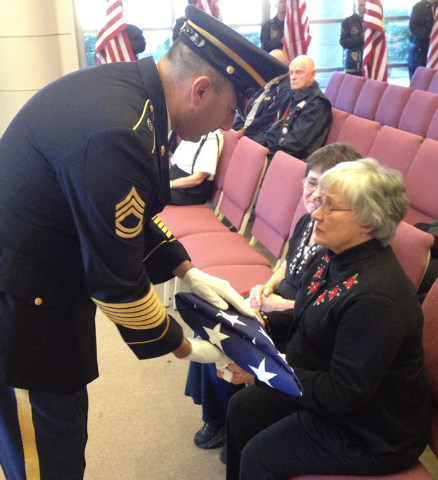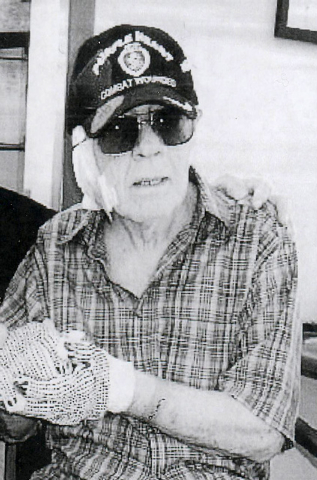Burial delays aplenty at veterans cemetery in Boulder City



Thursday was a day of closure that didn’t come soon enough for Barbara Russom.
She had waited more than three months to bury the ashes of her friend, Army veteran Thomas Francis Marion, at the Southern Nevada Veterans Memorial Cemetery in Boulder City. The decorated, Korean War ex-prisoner of war died Sept. 14 after a bout with cancer at age 79.
Because he had no immediate family, she had cared for him at her Henderson home until the last days of his life.
“I feel more at peace now,” said Russom, whom Marion had often said was his half-sister, because of their common Cherokee heritage. In reality though, she was his care provider and the one who crossed all the ‘t’s’ and dotted the ‘i’s’ for him to make sure he got his military funeral as promised for his 28 years of service in the armed forces.
She said she felt “angry and hopeless” while she waited. “It was frustrating. I felt guilty because he had a brother named, William, who had died back East, who was a sergeant in Vietnam. And I didn’t know if he (Thomas Marion) had children to contact.”
As is common at the cemetery for deceased veterans without surviving family members present, his memorial service was held Thursday followed by one for another former soldier, James Brown, who died June 20; and similarly for an Air Force veteran, Richard Melson, who died Sept. 25.
They aren’t the only veterans whose burials have been delayed weeks or months for one reason or another. Hugh “Slip” Slater, a retired Area 51 commander and decorated spy plane and World War II fighter pilot, died Nov. 26 and won’t be buried until Jan. 10. Likewise, Pearl Harbor survivor Clifton E. Dohrmann, a Navy veteran, died June 10 and wasn’t buried until July 16. Also, friends of blind Navy veteran Sandi Niccum, who died Nov. 15, waited until Dec. 12, for her memorial service at the vets cemetery.
Rep. Dina Titus, D-Nev., a member of the House Veterans Affairs Committee and ranking member of a subcommittee that includes memorial affairs, hopes Congress will support her effort to locate a national veterans cemetery in Southern Nevada to augment the one in Boulder City that is run by the state’s Office of Veterans Services.
“I have reached out to Nevada Department of Veterans Services, as well as the national VA, for additional information on recent reports of burial delays to determine what actions can be taken to improve the burial process,” Titus said in a statement Thursday.
She said she believes it’s the nation obligation to ensure all veterans receive a proper, timely burial. That’s the impetus for her plans to introduce the Veterans National Remembrance Act “to direct the VA to give priority for establishing new cemeteries to states that do not have a national cemetery and locate the new cemeteries near areas with large veteran populations.”
Russom welcomed Titus’ proposal. “Hopefully it will start a movement so that things will get done.”
Titus noted that Nevada has the largest veteran population without a national cemetery. “This would not only increase Southern Nevada veterans’ options for a final resting place, it would also give our veterans the choice of being buried in a prestigious national cemetery in their home state.”
Chris Naylor, superintendent of the Southern Nevada Veterans Memorial Cemetery, said because the Las Vegas Valley has a high percentage of veterans in its population — there are some 300,000 statewide — the cemetery is the second busiest state veterans cemetery in the nation with about 1,900 burials per year. Only Brig. Gen. William C. Doyle Memorial Cemetery operated by the New Jersey Department of Military and Veterans Affairs, 15 miles southeast of Trenton, N.J., is busier.
As the dying pace of local World War II, Korean War and Vietnam War veterans increases as they age, “We keep busy. That’s for sure. It’s an unfortunate busy,” Naylor said. He added that many out-of-state veterans are buried at the Boulder City vets’ cemetery because family members live here or the veterans lived here at some time in their lives.
Since the cemetery opened in 1990, almost 33,000 veterans have been buried there. With 40 out of 79 acres developed for grave sites, roads, buildings and places for placement of cremated remains, the other 39 acres will be used for burials until capacity is reached in about 35 years, Naylor said.
To meet the demand, he said as many as 10 funeral services are conducted per day with Mondays and Fridays booked through the near future because those are the most sought after days to accommodate weekend travel plans for families.
“Sometimes it does get a little backed up but usually we can get them in in one or two weeks,” Naylor said.
Willette Gerald, deputy director of the Nevada Department of Veterans Services, said family members for the most part dictate when their loved ones will be buried but some delays occur while a veteran’s eligibility status is determined. The task is more difficult if the veteran doesn’t have a family.
That fits Marion’s case. He was born July 21, 1934, in Brooklyn, N.Y., and was raised in St. Joseph’s home for boys and girls. He joined the Army in 1950 and was a navigator-photographer with the 1st Cavalry Division, flying missions over the Korean peninsula. His plane was shot down behind enemy lines on Jan. 8, 1951. He was held captive until his release in June 1954, nine months after the armistice agreement. He also served in the Vietnam War and his wife was killed during the war.
Retired 1st Sgt. Chuck Johnson, a 1st Cavalry Division veteran of the Korean and Vietnam Wars, attended Marion’s service Thursday. “It’s downright disgraceful that a guy who served his country has to wait in line to be buried,” he said.
Contact reporter Keith Rogers at krogers@reviewjournal.com or 702-383-0308. Follow him on Twitter @KeithRogers2.












